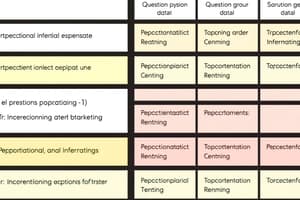Podcast
Questions and Answers
What type of group consists of participants who know one another, such as friends or colleagues?
What type of group consists of participants who know one another, such as friends or colleagues?
- Heterogeneous group
- Naïve group
- New group
- Pre-existing group (correct)
Participants in a naïve group have a specific connection to the subject matter.
Participants in a naïve group have a specific connection to the subject matter.
False (B)
What is the purpose of structural questions in research?
What is the purpose of structural questions in research?
To find out about the way a participant makes sense of the world.
Participants in a homogeneous group share specific _______ or experiences related to the subject.
Participants in a homogeneous group share specific _______ or experiences related to the subject.
Match the following types of questions with their purpose:
Match the following types of questions with their purpose:
Which type of question prompts participants to compare different events or experiences?
Which type of question prompts participants to compare different events or experiences?
Evaluative questions ask how a participant feels about something.
Evaluative questions ask how a participant feels about something.
What is an example of a structural question?
What is an example of a structural question?
A ____________ question asks participants to provide a general account of an event.
A ____________ question asks participants to provide a general account of an event.
Match the question types to their definitions:
Match the question types to their definitions:
Flashcards
Participant Differences
Participant Differences
Participants may have varying characteristics and experiences related to the subject matter.
Pre-existing Group
Pre-existing Group
Participants already know each other, often friends or colleagues.
New Group
New Group
Participants have never met before.
Concerned Group
Concerned Group
Signup and view all the flashcards
Naïve Group
Naïve Group
Signup and view all the flashcards
Homogenous Group
Homogenous Group
Signup and view all the flashcards
Heterogenous Group
Heterogenous Group
Signup and view all the flashcards
Descriptive Questions
Descriptive Questions
Signup and view all the flashcards
Structural Questions
Structural Questions
Signup and view all the flashcards
Contrast Questions
Contrast Questions
Signup and view all the flashcards
Evaluative Questions
Evaluative Questions
Signup and view all the flashcards
Descriptive Questions
Descriptive Questions
Signup and view all the flashcards
Structural Questions
Structural Questions
Signup and view all the flashcards
Prompts
Prompts
Signup and view all the flashcards
Probes
Probes
Signup and view all the flashcards
Clear Question Wording
Clear Question Wording
Signup and view all the flashcards
Study Notes
Qualitative Research
- Qualitative research explores research questions rather than testing hypotheses.
- It aims to understand how people perceive the world and their experiences.
- Qualitative research often focuses on in-depth understanding, constructing meanings, and describing experiences.
- Often used with interviews and focus groups.
Qualitative Design
- Qualitative design involves collecting and analyzing qualitative data using qualitative techniques.
- The design itself involves the combination of methods used to collect such data and the analytical techniques used.
Types of Qualitative Questions
- Well-suited for research questions about lived experience.
- Explore recent and emotional experiences.
- Explore experiences or perceptions of people in a specific context.
Qualitative Analysis Techniques (1 of 5)
- Content analysis: Used to identify themes or categories and generate frequency data within qualitative research. Qualitative data is coded into categories that are then counted.
Qualitative Analysis Techniques (2 of 5)
- Thematic analysis: Used to identify patterns or themes in qualitative data. Involves interpretation of themes by the researcher.
Qualitative Analysis Techniques (3 of 5)
- Grounded theory: Developed by observing and understanding a phenomenon in its local context; Data collection is repeated until no further themes emerge.
Qualitative Analysis Techniques (4 of 5)
- Interpretative phenomenological analysis (IPA): Used to explore the experiences of a particular homogenous group of people; Researchers consider how the group understands and makes sense of life experiences.
Qualitative Analysis Techniques (5 of 5)
- Discourse analysis: Focused on the ways language and speech are used to create meaning. Codes feature of speech such as pauses and interruptions.
Data Collection Methods
- Qualitative designs use a variety of data collection methods, such as questionnaires and focus groups, observations and real-world interactions, diaries, participant logs, online data, and secondary data sources.
Sampling Techniques
- Qualitative designs use purposive sampling, selecting participants based on specific criteria related to the research question.
- Theoretical sampling is another technique useful in grounded theory to recruit cases for testing emergent theory.
- Key informants are people whose position, experience, or expertise provide a considerable understanding of the research topic.
Ethical Considerations (Informed Consent)
- Provide sufficient information to enable participants to make an informed decision about participation.
- Include details about the goals of the study, what participants will do, social identities, recordings, online data, and secondary data sources.
Ethical Considerations (Confidentiality)
- Participants may be identifiable even when ID numbers are used.
- Quotations and descriptions of place settings need to be anonymized.
- Statements about how data will be stored.
Ethical Considerations (Data Security)
- Participants are easily identifiable if data is not stored securely.
- Include information about ethical issues, and how to reduce potential lasting impacts relevant to the study.
- Researchers need access to professional support.
Ethical Considerations (Debriefing)
- Qualitative research, especially, benefits from a comprehensive debriefing session.
- Debriefing must include details of the study's aims, data collection methods, and analysis approach.
- Participants should have access to information and support systems needed to process the study's impacts.
Studying That Suits You
Use AI to generate personalized quizzes and flashcards to suit your learning preferences.




